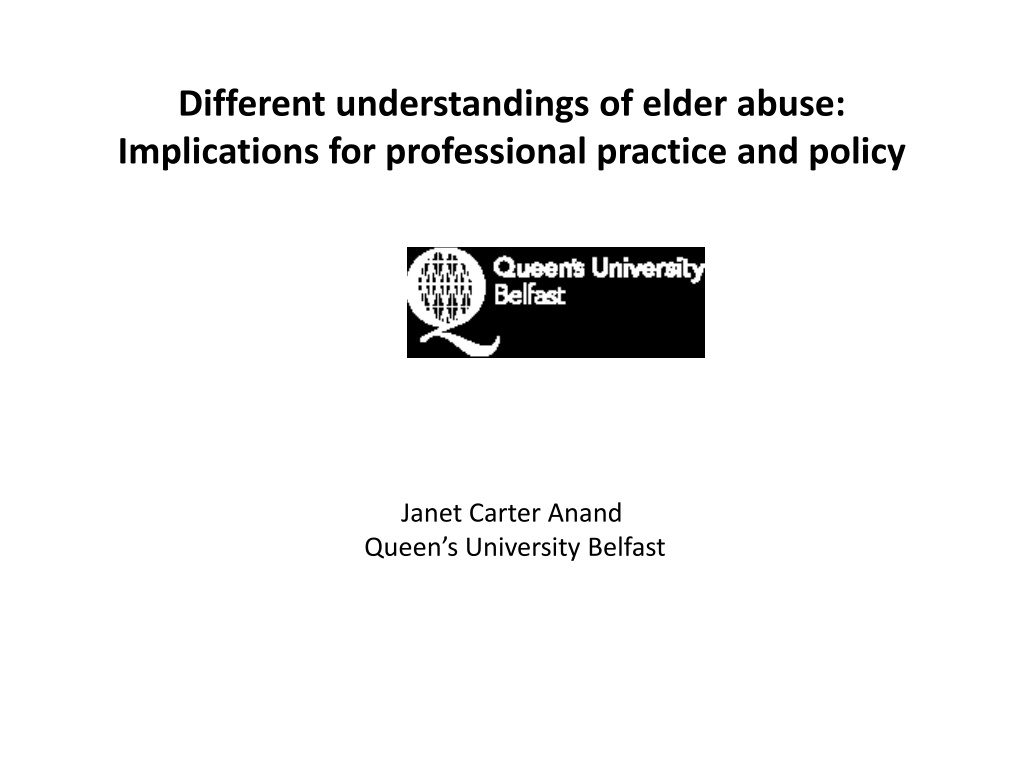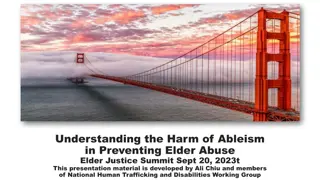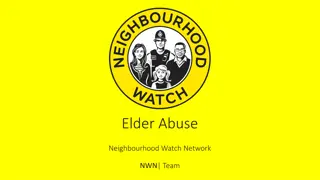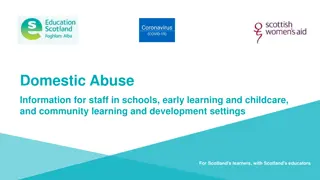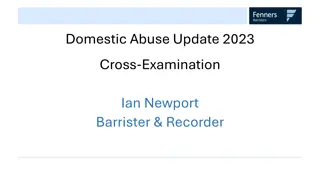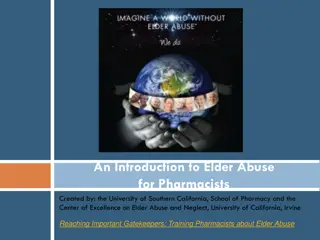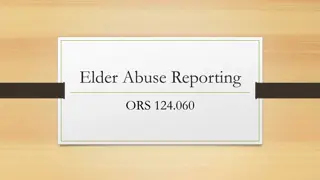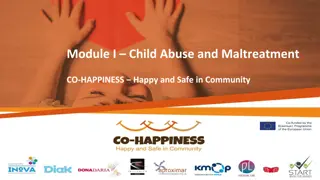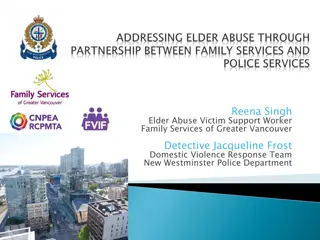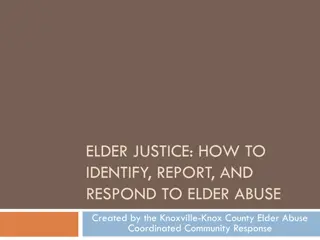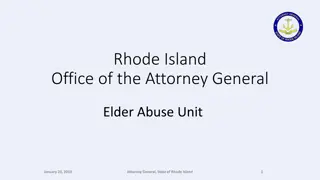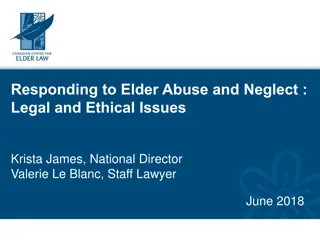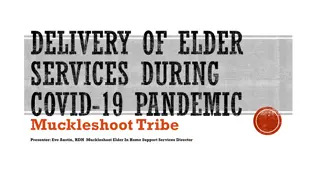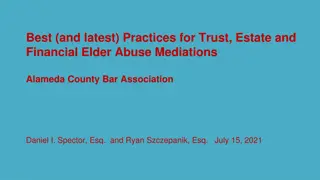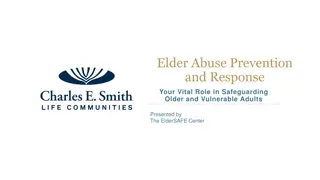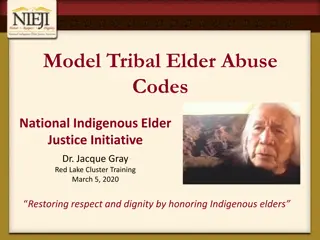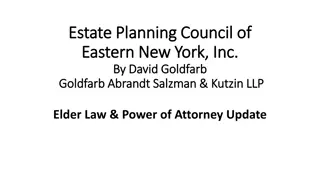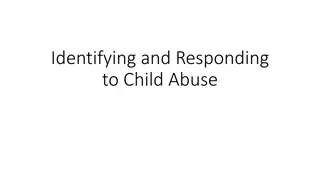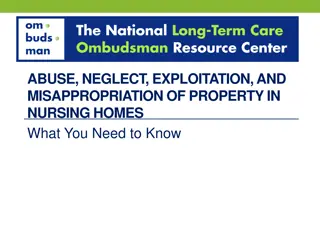Understanding Elder Abuse: Implications for Practice and Policy
Older people's conceptualization of elder abuse is not well-understood, with emphasis placed on themes like rights, choice, dignity, and respect. Professional responses vary, and there is limited consensus between older adults and health professionals on what constitutes elder abuse. This study aims to investigate older adults' perceptions of elder abuse, identify threats to their safety, determine services they would use if abused, and pinpoint desired service changes.
Download Presentation

Please find below an Image/Link to download the presentation.
The content on the website is provided AS IS for your information and personal use only. It may not be sold, licensed, or shared on other websites without obtaining consent from the author. Download presentation by click this link. If you encounter any issues during the download, it is possible that the publisher has removed the file from their server.
E N D
Presentation Transcript
Different understandings of elder abuse: Implications for professional practice and policy Janet Carter Anand Queen s University Belfast
The team Marita O Brien Independent Researcher Emer Begley Social Inclusion Officer, Age Action Ireland Janet Carter Anand Research Fellow, Social Policy and Ageing Research Centre, Trinity College Dublin and Lecturer in Social Work, Queens University, Belfast Campbell Killick Research Officer, South East Health and Social Care Trust, Northern Ireland Brian Taylor Senior Lecturer, Institute for Research in Social Science, University of Ulster Evelyn Doyle, Peer Researcher (NI) Mary McCarthy, Peer Researcher (ROI) Sam McCrossan, Peer Researcher (NI) Evelyn Moran, Peer Researcher (ROI)
Introduction Little is known about older people s conceptualisation of elder abuse Research highlights that older people placed particular emphasis on the themes of rights, choice, dignity, respect and the devaluing of older people in families and communities (WHO 2002) Evidence of inconsistency in professional response to elder abuse (Taylor and Killick 2012) Limited consensus between older people and health professionals regarding what constitutes elder abuse(Selwood et al. 2007; Thompson-McCormack et al. 2009) Heath professionals are more likely to identify abusive and potential abusive strategies than older people (Hempton et al. 2011)
Defining and Responding to Elder Abuse adapted from Harbison and Morrow (1998) crime vulnerability protection legal Older Adult Personhood victimhood personalisation agency
Study Aims Investigate what older adults perceive to be elder abuse Identify what older adults consider to be the main threats to their personal safety and well-being in their communities Identify what services older people would use if they experienced abuse Identify what changes to services older people would like to see
Qualitative Methodology Ireland Northern Ireland Number of participants 21 37 Gender 17 female 4 male 33 female 4 male Age 6 in each category, 65-69, 70-74, 75-79 And 3 between 80-84 9 in 65-69 range 8 in 70-74 10 in 75-79 4 in 80-84 2 in 85-89 4 age not indicated Location 12 rural 9 urban 19 rural 18 urban occupation 17 worked outside of home 4 home based work 33 worked outside of home 4 home based
FINDINGS: Safety and Wellbeing You become more vulnerable as you become older for the simple reason that maybe your health isn t good, become dependent on people (Paula, ROI, rural) My experience of homes is terrible and the smell of urine when you went in the door, it was terrible I dread the stage of where maybe I would have to go to one of those places myself, seeing all that I have seen (Liz, ROI, urban)
Loss of decision-making a big mistake...it s absolutely lethal no-one with cop on will do it, you ll end up in a nursing home [in] 2 seconds flat (Joan, ROI, urban). The one thing that would set me off, trying to put me in a care home...I would gladly go into sheltered accommodation, provided it was within Suburb, [where Joe lives] where I ve got friends care homes, it s like a very gentle prison for doting people but in sheltered accommodation you have a certain independence, you are still paying a rent a [name of organisation] dwelling with a good size communal hall in it, where people, men and women could play bowls or play other indoor games and still have their own flat within it, where they would still have that degree of independence (Joe, NI, urban).
Reasons for non-disclosure Report it sometimes they think you are a busy-body and are afraid to get involved in case people say oh you shouldn t be interfering, it s none of your business anyway (Stella, NI, urban). The neighbour knows that they are being abused, what can that neighbour do because the person that s been abused will not turn against their own family and support the person that might make the complaint. If you made a complaint to somebody about that, it is you that would get into cold water, the people that are doing the abusing, would go free (John, NI, rural) Vera: You won t really want anybody to know, you would hide it rather than let anyone know if your family was being bad to you, won t you. John: Or otherwise they d put you into a home (Vera and John, NI, rural) [They are] over efficient, [as they] look into things they have no need to look into (John, NI, rural)
Staying Connected There is a great bus service, I m collected at my house on a Friday morning we can do our bits and pieces and leave everything at the shop in our bags, and when it s time to go home, the minibus comes for us and the driver of the bus lifts all the bags out and then when he leaves us off at our houses, he walks us to the door and will carry the stuff in and put it on the kitchen table people otherwise won t be able to get out to do their own shopping unless a member of their family [brings them] and when your with [a] member of family oh hurry up , you have only so long and all this sort of thing whereas when older people go out like that you can sit in the wee place [local grocers with bar] they have for us to sit until the bus comes and we can chat away, whereas if you are with your family, what are you doing talking there, will you hurry up come on, they can t wait for you, why are you taking so long (Helen, ROI, rural)
Supporting Family Carers I mean we didn t want to have her in a home, we couldn t, we were spread all over the place and we couldn t, and there was nothing done to ease the sort of guilt, that we felt about having to have her there (Janet, NI urban). All the books in the world about babies but there is nothing to tell you this may happen [to an older person] (Eve, NI urban).
Creating Awareness the importance of social interaction and friendship networks for positive mental health; planning for future care needs; dementia education and training; practical education for family caregivers; educating young people through multi- generational programmes at post-primary level and civic programmes in national school to teach, respect for elders .
Interaction with Professionals If they knew someone was coming round, the air- freshener was gone into the carpets, and there was vases of flowers, my reckoning is that, they should never be told when someone is coming (Sarah, NI, urban) The needs of vulnerable older people for emotional support how do you vet a home for warmth, I m talking about human dignity, warmth impossible to legislate or ensure the meeting of older people s emotional needs for warmth and human dignity (Amy, NI, urban)
Personhood, Recognition and Trust I think it comes under the categories of physical abuse, financial and emotional, and emotional comes at the very top where I m concerned in the withdrawal of interaction, where the older person becomes almost invisible in the corner or wherever, and even touching you know, the whole withdrawal of human kindness almost Amy ( NI, urban) [family] they take you somewhere and they leave you and they say I haven t time to stop... Well won t you like them to come in and sit down and have a chat, usually they are saying I have to rush to take so and so home from school and I have to rush to do that, but you know they are so good but still. Tara (NI rural) denying them of their basic rights and I would go as far to say even the knowledge of their basic rights, a total indifference to their dignity. Patsy (NI urban)
Discussion Withdrawal of Personhood a new type of abuse? How can professional practice and policy enhances personhood ?
Implications for Professional Practice Practice that supports personhood at the subjective, interactive and social interface Personhood Framework, Person Centred Practice Centrality of knowing the person, their values, biography, relationships, seeing beyond the immediate needs and authenticity (McCormack 2004) -Life Course Perspective Addressing issues of loss and trauma (neglected area) Professional responsibility i.e. dignity and rights
Implications for Policy Inclusion and Rights Safety and security e.g. fear of nursing homes Barriers to accessing services e.g. stigma Empowerment and enablement e.g. transport, role of community based groups, Good Morning Service, HOPE Choice and Control Person-centred and self directed services Supporting families e.g. mediation services Addressing fear e.g. fear of nursing homes Creating Awareness Professional education Promoting personhood and citizenship
It can be argued, that more sustainable and proactive models of service delivery which interweave informal sources of support (family, friends, peers, community etc.) with formal services (health, welfare, advocacy and legal services) are the key to empowering older people in communities. However, we first need to establish how older people think and feel about the issues and involve them in the response!
Contact details For further information please contact: Dr Janet Carter Anand Email: j.anand@qub.ac.uk Telephone: 028 90975158 Report available to download from www.ageaction.ie or www.cardi.ie
